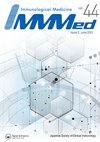JAK抑制剂治疗血液病的最新进展。
IF 2.9
Q3 IMMUNOLOGY
Immunological Medicine
Pub Date : 2023-09-01
Epub Date: 2022-10-28
DOI:10.1080/25785826.2022.2139317
引用次数: 5
摘要
JAK抑制剂是治疗血液系统疾病的重要选择,尤其是骨髓增生性肿瘤。Ruxolitinib是首个获准临床使用的JAK抑制剂,可改善骨髓纤维化和真性红细胞增多症患者的脾肿大并改善其体质症状。Ruxolitinib也可用于控制传统治疗控制不足的真性红细胞增多症患者的红细胞压积水平。此外,移植前使用鲁索利替尼可以改善骨髓纤维化异基因造血干细胞移植的结果。与这些临床优点相反,鲁索利替尼的疾病改善作用,即减少恶性克隆或改善骨髓病理学表现的证据有限,许多骨髓纤维化患者因不良事件或疾病进展而停用鲁索利替尼。为了克服鲁索利替尼的这些局限性,已经开发了几种新型的JAK抑制剂。其中,fedratinib被证明即使在对ruxolitinib有耐药性或不耐受性的患者中也具有临床优点。Pacritinib和momelotinib分别对伴有血小板减少或贫血的骨髓纤维化患者显示出优点。除了治疗骨髓增生性肿瘤外,最近的研究表明,JAK抑制剂是皮质类固醇难治性急性和慢性移植物抗宿主疾病的新的、有吸引力的治疗选择。本文章由计算机程序翻译,如有差异,请以英文原文为准。
Recent progress of JAK inhibitors for hematological disorders.
Abstract JAK inhibitors are important therapeutic options for hematological disorders, especially myeloproliferative neoplasms. Ruxolitinib, the first JAK inhibitor approved for clinical use, improves splenomegaly and ameliorates constitutional symptoms in both myelofibrosis and polycythemia vera patients. Ruxolitinib is also useful for controlling hematocrit levels in polycythemia vera patients who were inadequately controlled by conventional therapies. Furthermore, pretransplantation use of ruxolitinib may improve the outcome of allo-hematopoietic stem cell transplantation in myelofibrosis. In contrast to these clinical merits, evidence of the disease-modifying action of ruxolitinib, i.e., reduction of malignant clones or improvement of bone marrow pathological findings, is limited, and many myelofibrosis patients discontinued ruxolitinib due to adverse events or disease progression. To overcome these limitations of ruxolitinib, several new types of JAK inhibitors have been developed. Among them, fedratinib was proven to provide clinical merits even in patients who were resistant or intolerant to ruxolitinib. Pacritinib and momelotinib have shown merits for myelofibrosis patients with thrombocytopenia or anemia, respectively. In addition to treatment for myeloproliferative neoplasms, recent studies have demonstrated that JAK inhibitors are novel and attractive therapeutic options for corticosteroid-refractory acute as well as chronic graft versus host disease.
求助全文
通过发布文献求助,成功后即可免费获取论文全文。
去求助
来源期刊

Immunological Medicine
Medicine-Immunology and Allergy
CiteScore
7.10
自引率
2.30%
发文量
19
审稿时长
19 weeks
 求助内容:
求助内容: 应助结果提醒方式:
应助结果提醒方式:


